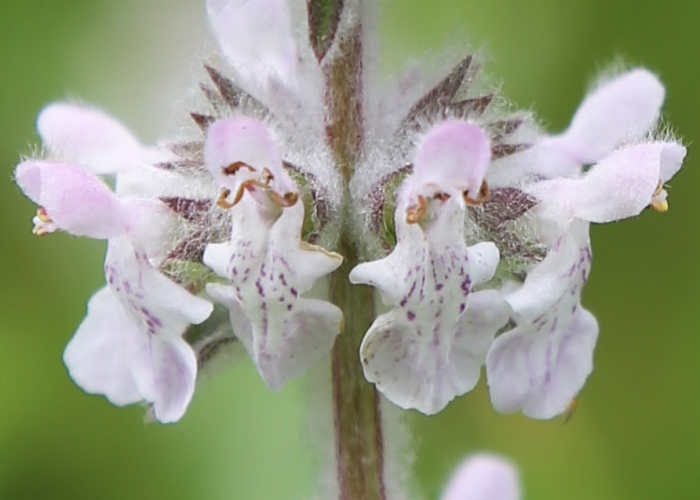Whitestem Hedgenettle
(Stachys albens)
Whitestem Hedgenettle (Stachys albens)
/
/

Dcrjsr
CC BY 4.0
Image By:
Dcrjsr
Recorded By:
Copyright:
CC BY 4.0
Copyright Notice:
Photo by: Dcrjsr | License Type: CC BY 4.0 | License URL: https://creativecommons.org/licenses/by/4.0 | Uploader: Dcrjsr | Publisher: Wikimedia Commons | Title: Stachys_albens_white-hedgenettle_flower_closeup.jpg | Notes: |









































Estimated Native Range
Summary
Stachys albens, commonly known as Whitestem Hedgenettle or White Hedgenettle, is an evergreen perennial herb native to riparian zones, wet meadows, and stream banks in California, particularly in the Sierra Nevada and the northern and central parts of the state. It typically grows to a height of 1-3 feet and a width of 2-3 feet. The plant is characterized by its white to pale pink flowers that bloom from late spring to early fall, arranged in dense whorls along the upper part of the stem. The foliage is fuzzy, with opposite, triangular, serrate leaves, and the stems are square in cross-section. When bruised, the plant emits a minty fragrance due to its relation to the mint family.
Whitestem Hedgenettle is valued for its ability to thrive in moist, shaded environments, making it suitable for water gardens, riparian plantings, and as a ground cover in shady areas. It is also appreciated for its long blooming period and the textural interest provided by its fuzzy foliage. In cultivation, it prefers part shade to full shade and can tolerate a range of water conditions, from low to high, as long as the soil has good drainage. While it is not commonly afflicted by diseases, it can be susceptible to root rot if the soil is too wet. This plant is not known for aggressive roots or significant pest problems. It is also used in restoration projects due to its native status and benefits to local ecosystems.CC BY-SA 4.0
Whitestem Hedgenettle is valued for its ability to thrive in moist, shaded environments, making it suitable for water gardens, riparian plantings, and as a ground cover in shady areas. It is also appreciated for its long blooming period and the textural interest provided by its fuzzy foliage. In cultivation, it prefers part shade to full shade and can tolerate a range of water conditions, from low to high, as long as the soil has good drainage. While it is not commonly afflicted by diseases, it can be susceptible to root rot if the soil is too wet. This plant is not known for aggressive roots or significant pest problems. It is also used in restoration projects due to its native status and benefits to local ecosystems.CC BY-SA 4.0
Plant Description
- Plant Type: Herb
- Height: 1-3 feet
- Width: 1.5-3 feet
- Growth Rate: Moderate
- Flower Color: White
- Flowering Season: Spring, Summer, Fall
- Leaf Retention: Evergreen
Growth Requirements
- Sun: Part Shade, Full Shade
- Water: Medium
- Drainage: Slow, Medium, Fast
Common Uses
Bee Garden, Bird Garden, Butterfly Garden, Deer Resistant, Fragrant, Hummingbird Garden, Low Maintenance, Rabbit Resistant, Rock Garden
Natural Habitat
Riparian zones, wet meadows, and stream banks in California, particularly in the Sierra Nevada and the northern and central parts of the state
Other Names
Common Names: White Hedgenettle
Scientific Names: , Stachys albens, Stachys albens var. juliensis, Stachys velutina, Stachys lanuginosa, Stachys malacophylla, Stachys pycnostachya,
GBIF Accepted Name: Stachys albens A.Gray